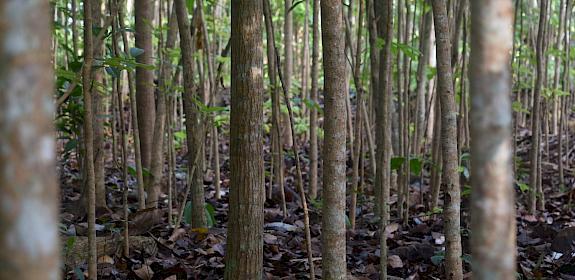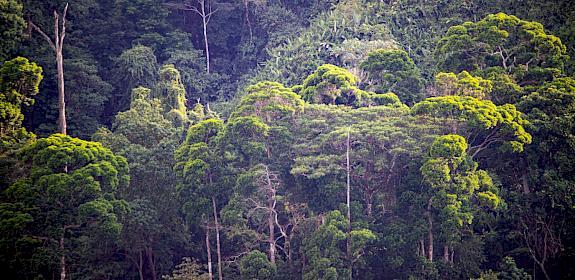
protecting forests and livelihoods
Trees act as the Earth’s lungs, giving rise to dense forests that provide sanctuary to a multitude of species. Their support to humanity is wide-ranging, with timber playing an essential role in upholding our livelihoods.
Timber, a highly valuable global commodity, has the potential to generate significant income for local communities, businesses, and nations when managed legally and sustainably. Unfortunately, in many tropical countries, particularly those in Africa and South America, between 50-90% of timber is suspected to be harvested illegally.
This illegal trade is facilitated by government mismanagement, ineffective enforcement, and corruption motivated by financial greed. These factors contribute to alarming rates of deforestation, habitat, and revenue loss.
between 10–30%
of global timber trade is illegal
rosewood
is in high demand in China and neighbouring countries
93%
of Mozambique’s 2013 timber exports to China were considered illegal
More than 1/3
of Ebony and Rosewood species are found in Madagascar
Cultivating change in the timber trade
In our mission to protect trees and timber resources, TRAFFIC collaborates with governments, the private sector, local communities, and researchers. We pursue international agreements to prevent overexploitation and ensure benefits from legal and sustainable trade are shared fairly and equitably.
In African nations, we partner with governments and national agencies to promote sustainable and legal harvesting of threatened species like Ebony and Rosewood. This involves developing legality training modules, fostering cooperation, information sharing, as well as greater coordination and enforcement of legal frameworks.
TRAFFIC also supports COMIFAC (the Commission of Central African Forests), offering expertise in policy and legal reviews. We monitor timber trade, both legal and illegal, provide training, and assist in the implementation of CITES.
With these collective efforts, we’re planting the seeds of change for a greener future.
A timber stockpile outside of Douala, Cameroon © A. Walmsley / TRAFFIC
i
key timber species and uses
African species
Madagascar and Africa are home to coveted Rosewood and Ebony species, with their beauty and exceptional durability for use in furniture making them prime targets for overexploitation.
Back in February 2017, we released a report that explored the sustainability and stewardship of Madagascar’s precious timber resources. The report highlighted that a blend of political instability, government mismanagement, unchecked forestry practices, and the failure to impose penalties on well-known timber traffickers had allowed a timber management crisis to take root in Madagascar.
Since 2017, we’ve been taking action based on the recommendations in the report. We actively monitor court cases related to this issue and support law enforcement agencies in tackling cases involving corruption and money laundering.
Read more about Madagascar's timber harvesting crisis.
In June 2015, TRAFFIC and WWF organised the 3rd Annual East Africa Timber Trade Stakeholders Forum. The event was designed to address the growing demand for timber and the increasing flow of timber and timber products, not just within East Africa but also beyond its borders.
The forum aimed not only to tackle these issues head-on but also to encourage communication and collaboration throughout the region to ensure that forests across East Africa continue to flourish!
Asian species
The timber trade looms large in Asia, with TRAFFIC studying both legal and illegal aspects of the trade in valuable Asian timber species exploited for logging interests.
We explore the trade of tropical hardwoods from Southeast Asia, such as Merbau and Ramin. These woods are popular in the EU for making products such as flooring and picture frames.
Our research also examines the harvesting of non-timber products from trees that are largely wild harvested, such as Taxus, a yew tree with anti-cancer properties, and Agarwood, a resin with a fragrant smell that is used for incense and healing.
It's crucial to conserve these tree products to maintain biodiversity, nurture sustainable livelihoods, and to combat deforestation—a delicate balance between economic interests and environmental preservation.
talking timber trade
Explore the latest publications, reports and papers from TRAFFIC related to forest conservation and trade in timber.
Visit our resource library for the full TRAFFIC publication archive.

Sustainable timber trade
We're working to help promote legal and responsible timber trade. By strengthening local knowledge, national regulation and enforcement capacity, we're helping to protect our world's forests and those they support.

FairWild
The FairWild Foundation was established in 2008 to promote the sustainable use of wild-collected plant ingredients in trade and ensure a fair deal for the communities who harvest them.









